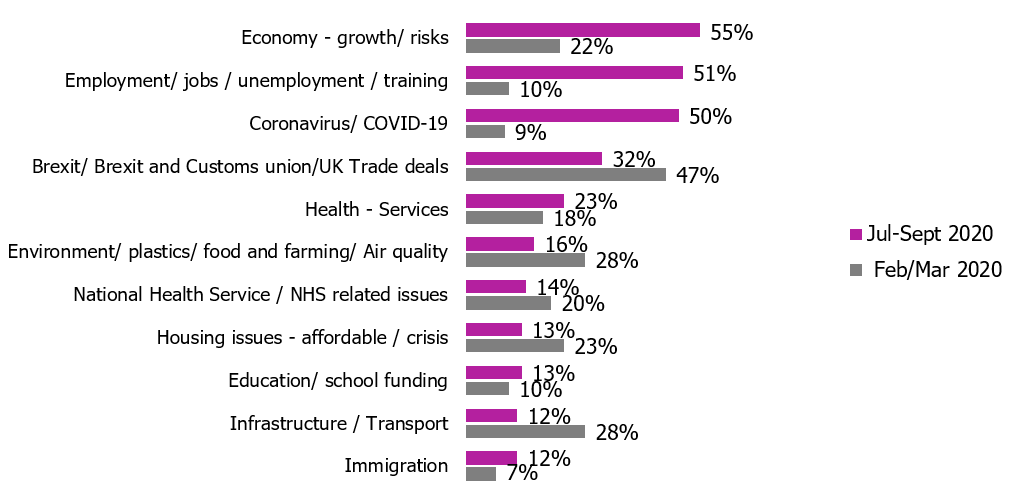The UK is facing a winter of decreased social security as new lockdown measures have taken hold. Whilst there have been some welcome measures surrounding job retention, many families across the country are facing an acute strain of rising costs associated with spending winter at home. Meanwhile the number of the general public relying on the charity sector has increased and is predicted to rise further as we move into winter. The pandemic is therefore continuing to put a strain on the social security, mental health and general wellbeing of families across the country.
Looking at the forecast of issues expected to be at the top of agenda for politicians over the next twelve months brings some cause for concern. In our most recent wave of polling with politicians between June and August of this year, we asked which issues would dominate their agenda over the next year. Unsurprisingly the pandemic has usurped many issues as top of agenda for most politicians. Alongside Covid, the main issues of concern amongst MPs are jobs and the economy. Again, this is not necessarily surprising, however it is interesting to see how many other issues have been eclipsed by the pandemic.
Social care has been a defining issue of the pandemic with an immense amount of media coverage showing how badly affected this already struggling system has been. However only 9% of MPs said it would be top of their agenda over the course of the next year, and there has been no statistically significant rise here since we previously asked it in February when 13% listed social care as a top of agenda issue. Equally issues such as welfare and poverty and inequality have seen no statistically significant increase in since February/March and remain low lying issues of concern for most MPs.
All of this points to the propensity of MPs to conceptualise the pandemic primarily as an economic and health concern whilst the holistic affects are being somewhat overlooked. The question for charities is therefore about how they can begin to change the political narrative going forwards such that the broader implications of Covid are accounted for, and the narrative of strong economy, strong society that has so frequently been pedaled by the current government is adequately challenged.
Chart 1: Issues at the top of MPs agendas
“Which issues do you think will be at the top of your political agenda over the next 12 months?” Unprompted question, ranked by total
Source: Charity Parliamentary Monitor, Jul-Sep 20, nfpSynergy | Base: 101 MPs
Marcus Rashford’s recent campaign to secure an extension of the free school meal program is an important example of how charity and advocacy can be combined into a potent force that places issues squarely on the agenda of MPs, whilst equally prompting a vital public conversation on the matter. Within a political climate in which MPs agendas seem squarely focused on jobs and employment, there can be no doubt that this partnership of Rashford and Fareshare has been important and effective in equal measure.
Rashford’s campaign is equally pertinent as it has reversed a worrying trend within the current government of reneging on key social welfare commitments, leaving it instead up to the general public or charity sector to fill the gaps. The government has been quick to praise the grassroots donations of food for individuals, charities and local businesses up and down the country for providing an important public service, and until recently retreated further into their idea that they should not be providing such an essential service for apparent fears over increasing dependency.
It is rightly a tremendous source of comfort that society has continued to respond to the pandemic with such a degree of empathy and solidarity. Stories such as the young footballer who raised over £1000 to support Rashford’s efforts are of course wonderful and warming. However as a society we should be aware of the failure of government to adequately provide the minimal amount of social security needed for families struggling during the pandemic. Ultimately these spontaneous acts of kindness and charity operations ought to be combined with strong public awareness and advocacy campaigns and not just become actions that ‘plug the gaps’ when the government fails to take adequate action.
This is not to suggest that charities will not encounter significant bulwarks in attempting to do this. In April-June of this year we asked MPs what sort of helpful actions charities should be engaging with in light of Covid. Only 46% of MPs said that campaigning on behalf of vulnerable beneficiaries would be a helpful action suggesting that there is a relatively entrenched idea that charities should not be overtly political in their work. Breaking this down by party it becomes clear that the Conservatives are far more skeptical towards this idea with 27% of Conservative MPs saying this would be useful compared to 72% of Labour MPs. This divide is not surprising and suggests charities with have their work cut out for them in getting issues onto the political agenda and changing government action – perhaps that makes such actions all the more important.
Conclusions
There exists a relatively entrenched critique of the charity sector from parts of the hard left that understands charity as apolitical and something that may be relied upon to prop up austerity-based government policy. This is of course a little harsh and a relatively blunt method of analysing what is a complex sector in which charities are involved in not just service provision, but important forms of advocacy and awareness raising.
In the current climate where politicians are showing a reluctance to comprehensively appreciate or address issues of social insecurity, it is all the more important that charities remain engaged in such forms of action that highlight the challenges faced by their beneficiaries. Rashford’s partnership with Fareshare and the success of their recent campaign illustrates the sort of political action that can be generated though advocacy and it should be an important example for other campaigning charities right now. Charities urgently need to be vocalizing their concerns, highlighting their important work and pulling political and public attention towards other issues that are being subsumed into the largely economic agenda of the Covid response.
Whilst there might be some ripples of concern within the sector that it has taken a figure of celebrity status to garner the sufficient public and political attention an issue as serious as food poverty in the UK deserves, perhaps this form of charity-celebrity campaigning could become an effective model employed by others going forwards.


